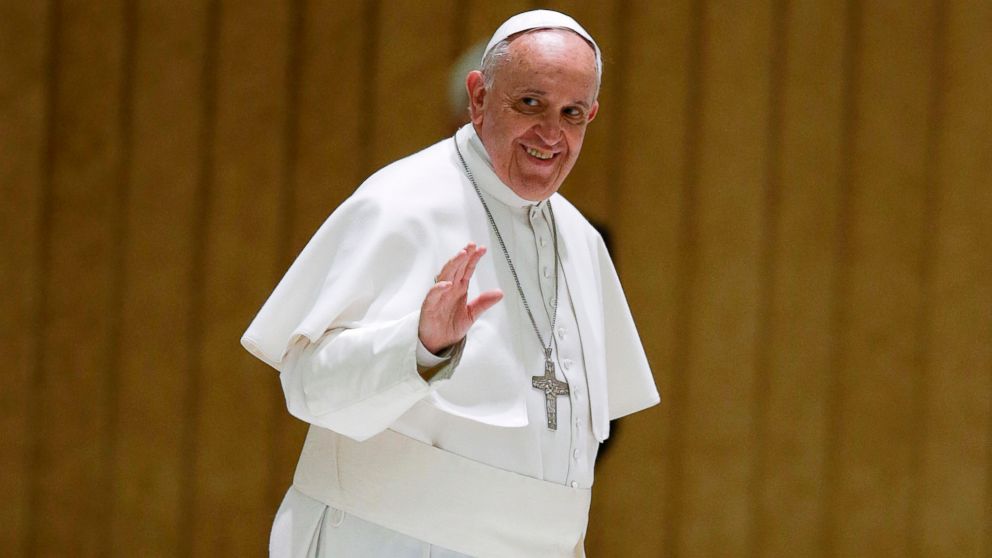Column: The Pope and The Donald: Opposites in Common
The latest column from Matthew Dowd.

— -- What do Pope Francis and Donald Trump have in common and inform us broadly? When old traditional institutions falter, are unresponsive to the public, and begin to be dismantled, the old rules and expectations no longer apply.
As Pope Francis prepares to make his first visit to the United States, he will drop into America at a time when the political environment has been incredibly disrupted and under enormous pressure and change. And a larger-than-life billionaire continues to occupy a majority of the conversation.
At first blush, we see the Pope and Trump as two completely divergent leaders on the opposite ends of the spectrum: the Pope a spiritual man of great humility; Trump an unabashed capitalist of great narcissism. The Pope a man who speaks of the dangers of wealth and celebrates the simple life; Trump a man who celebrates wealth, fame and fortune. The Pope a modest man who took his name from a modest saint; Trump who splashes his own name across buildings, planes and helicopters. The Pope a leader who is trying to bring folks together through mutual understanding, love and compassion; Trump a belligerent bully at times dividing people through name-calling and mean-spiritedness.
But the two men have some important qualities in common as many larger-than-life figures usually do. Both were consummate insiders who are now approaching their forums as outsiders. Each are leading populist movements by tapping into anger, frustration and anxiety as the world seems to be spinning out of control. These movements are taking on the establishment of their respective institutions in which an old guard has lost control. Trump in a way that feels destructive, Pope Francis in a constructive manner. Both are perceived as exceedingly authentic in who they are -- each genuine in how they come across. Both are incredibly astute strategic leaders in their own right -- strong and confident and having a high degree of emotional intelligence and understanding what people respond to. We have seen Trump's amazing use of imagery and words on the campaign fields that get passionate responses.
But the Pope is equally adept at imagery and strategy to reach maximum impact -- look at every move he has made to convey a message. It is not surprising about Pope Francis since his formative years were in Argentina under the immense shadow of a wildly popular and populist Juan Peron. Peron was a huge advocate for the poor, forgotten, and downtrodden, was a genius at the use of symbols, imagery, communication, and moving the political will. It seems the Pope as a young man observed and learned much from Peron.
Looking past the specific differences and the similarities just mentioned, what do the rise of these two men fundamentally tell us about culture today. Each one is a larger-than-life persona who has emerged as the status quo institutions they seek to lead have come under disrepair, are tired, crumbling, and suffered great failure. The old guard of each institution is grasping to hold on to power they are losing quickly. It seems as the old institutions fail, until new ones are built, the public or constituencies responds to outsized personas. We see the rise of the cult of personality for both Pope Francis and Trump.
But are these big personas helping the old institutions Trump and the Pope are today representing? It seems not. As the Pope's popularity around the globe has soared, and many in the world cheer him, there has not been a measurable increase of people in Catholic Church pews nor has there been a rise in donations to the Vatican or the Church. We like and respect the Pope, but many still feel the Catholic Church is in need of fundamental reforming.
And as Trump has risen as the current leader of the GOP, he hasn't caused people to feel better about the Republican Party and hasn't caused more voters to be members of the party. In fact, it seems the exact opposite is happening as the Republican Party is viewed more unfavorably and out of touch than ever before.
Both Pope Francis and Trump (and the large personas they carry) actually may be contributing to and speeding the demise of the exact institutions they lead. The hierarchical Catholic Church, which has been in place for hundreds of years, may finally reach a point of new construction (more horizontal and local), and Francis may be a significant part of that movement. And Trump may actually be the match which burns down the out of step GOP party (or broadly status quo politics), and a new and independent reforming institution may arise -- one more horizontal and locally empowered.
Yes, the hearts and souls of Trump and Pope Francis appear vastly different, and there motivations and intentions for leadership probably come from polar opposite places, but their existence at this point tells us a lot about the state of the world, divergent institutions, and ourselves. As Pope Francis steps foot off the plane in our nation's Capitol very soon,and will speak directly to leaders of both political parties, this is a moment we should all pause and understand what it means. I for one am excited about the surprising reforms two divergent leaders may be spontaneously igniting. As Pope Francis has said, "God is always a surprise. I await the surprise of each day."
There you have it.
Matthew Dowd is an ABC News analyst and special correspondent. Opinions expressed in this column do not reflect the views of ABC News.




